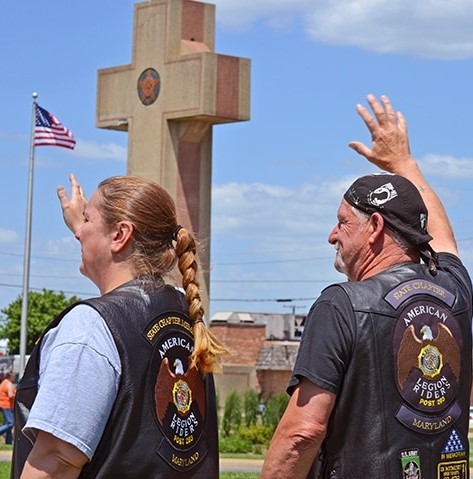We honor our fallen soldiers. This is important. If, for nothing else, it gives those who serve a little comfort knowing they won’t be forgotten as well as helps families and friends of the lost, hopefully, obtain closure. Memorials and graves are sacred. This is just and good for civilized society.
But there is always someone wanting to complain about anything and everything.
Atheists, who are constantly in seek and destroy mode, have set their sights on a World War I memorial in Maryland. This memorial honors local military servicemen who lost their lives in The Great War. The memorial is a cross. And atheism does not allow for religious tolerance of any kind.
The US Supreme Court heard oral arguments on this today in what has made it to the High Court in two cases; American Legion v. American Humanist Assn., and Maryland-National Capital Park v. American Humanist Assn. The questions before the court are (from the SCOTUS website):
1. Whether a 93-year-old memorial to the fallen of World War I is unconstitutional merely because it is shaped like a cross.
2. Whether the constitutionality of a passive display incorporating religious symbolism should be assessed under the tests articulated in Lemon v. Kurtzman, 403 U.S. 602 (1971), Van Orden v. Perry, 545 U.S. 677 (2005), Town of Greece v. Galloway, 134 S. Ct. 1811 (2014), or some other test.
3. Whether, if the test from Lemon v. Kurtzman, 403 U.S. 602 (1971), applies, the expenditure of funds for routine upkeep and maintenance of a cross-shaped war memorial, without more, amounts to an excessive entanglement with religion in violation of the First Amendment.
And:
Whether the Establishment Clause requires the removal or destruction of a 93-year-old memorial to American servicemen who died in World War I solely because the memorial bears the shape of a cross.
The cross was erected in 1925 on private land. In no way does the cross specifically mention Christianity, it is the symbol popularly used for graves in Europe for World War I causalities, regardless of the fallen’s religion. Decades later the land the cross sits on was purchased by the local government and a roundabout was created at the cross. So now that the cross is on public land, and the local government provides a minimal amount of maintenance by mowing the grass around the cross, angry God-hating atheists, hellbent on removing any signs of religion from public, have complained. On the cross the word “valor” appears at the bottom.
There is no case to make that this cross endorses religion. If we go by the Lemon Test, then the Court should rule that the cross can stay as the primary purpose of the cross is to honor the fallen soldiers. The fact that it is now on public land is not enough to demand its removal. And as far as the “reasonable observer” part goes, reason has left the radical God-hating atheists long ago.
In oral arguments today, liberal Justices Stephen Breyer and Elena Kagan seemed to appreciate the significance of the memorial’s history. The origins of this memorial are key. And the secular way it honors the lives lost is irrefutable. Just being a cross means pro-Christianity and nothing else is too simple of an explanation in a complex situation.
Some see this case as an opportunity to overturn the Lemon Test. Chief Justice John Roberts doesn’t like cases like that. He prefers narrow opinions. The Lemon Test has been problematic in the past. Adding the “reasonable observer” did not clarify the original Test as an observer is never purely objective and in today’s hyper-sensitive political environment anything and everything is offensive to someone.
Maybe it is time to take down the Lemon Test, but by all means keep the cross memorial. It is there to honor lives lost in service to this country. It is a just and good memorial to the greatest sacrifice.

Photo from the American Legion
.